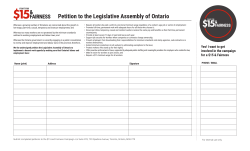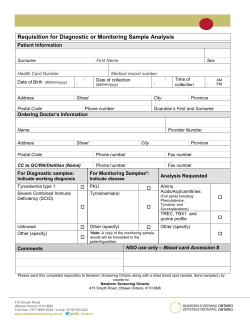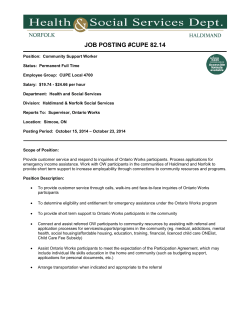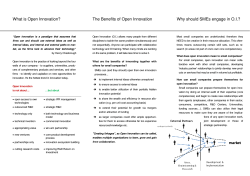
presentation (see pdf) - Canadian Meteorological and
Innovation Support Programs available for Collaboration between Universities, Private Sector and Government Departments Canadian Meteorological and Oceonographic Society (CMOS) webinar, April 22 2015 Jo Van Betsbrugge, PhD Innovation Advisor – Conseiller en innovation Jo.vanbetsbrugge@cnrc-nrc.gc.ca About the NRC Concierge Service Federal Support Programs Provincial Support Programs Slide 2 of 29 About the NRC Concierge Service Free service Launched in December 2013 Offered by the National Research Council Free personalized guidance and advice on government innovation support programs for SMEs Delivered by Innovation Advisors across Canada Slide 3 of 29 NRC Innovation Advisors (April 2015) Slide 4 of 29 NL+LD, PEI, NS, NB, NU Peter Howell St. John's Rick Nowlan Moncton peter.howell@nrc-cnrc.gc.ca rick.nowlan@nrc-cnrc.gc.ca Quebec Jo Van Betsbrugge Pierre Vallée Luc Péloquin jo.vanbetsbrugge@cnrc-nrc.gc.ca pierre.vallee@cnrc-nrc.gc.ca luc.peloquin@cnrc-nrc.gc.ca Montreal Quebec Montreal Eastern and Northern Ontario Anet Greenley Ottawa Bradley Pinch Ottawa anet.greenley@nrc-cnrc.gc.ca bradley.pinch@nrc-cnrc.gc.ca GTA, South East Ontario Melisse Craig Toronto melisse.craig@nrc-cnrc.gc.ca GTA, South West Ontario Trish Barrow Toronto trish.barrow@nrc-cnrc.gc.ca AB, SK, MB, NWT Ronald Matheson Karl Miller Edmonton Calgary ronald.matheson@nrc-cnrc.gc.ca karl.miller@nrc-cnrc.gc.ca BC, Yukon Erik Kaas Rob McGarry Vancouver Vancouver erik.kaas@nrc-cnrc.gc.ca rob.mcgarry@nrc-cnrc.gc.ca IDEA Marketable Products Which support programs to use to turn a novel idea into a marketable product? Referrals to federal, provincial and regional funding programs and innovation resources FEDERAL PROVINCIAL REGIONAL Slide 6 of 29 Our Client Base Innovative* companies with less than 500 employees (SMEs) Any stage of the company life cycle (start-up, pre-revenue, commercial) Any stage of technology or product development (prototype, testing, validation, manufacturing,..) Seeking funding, advice, expertise, facilities etc. *An innovation is the implementation of a new or significantly improved product (good or service), or process, a new marketing method, or a new organizational method in business practices, workplace organization or external relations. The minimum requirement for an innovation is that the product, process, marketing method or organizational method must be new (or significantly improved) to the firm. (Oslo Manual definition, 2005) Slide 7 of 29 How Concierge Service Works Helping SMEs grow their business through customized guidance, advice, and referrals to the most relevant programs and services. Contact concierge service • Phone (1-855-53-GUIDE) , email or web (concierge.portal.gc.ca) Obtain a personnalized service • Needs assessment– team, technology/product, strategy, financial needs, …. Follow up by email and direct referrals Slide 8 of 29 Federal Support Programs Slide 9 of 29 National Research Council– IRAP INDUSTRIAL RESEARCH ASSISTANCE PROGRAM (IRAP) o Type: Financial Contribution (non-repayable) o Application Period: Open o Competitive, based on level of technological innovation, market potential, and management team YOUTH EMPLOYMENT PROGRAM o Type: Grant towards first year salary (up to $20,000) o Application Period: Open o Age limit: 30 o Based on qualified candidates BUSINESS INNOVATION ACCESS PROGRAM (BIAP) o Type: Financial Contribution (non-repayable) o 75%, up to $50,000 o Technical or Business Services, offered by publicly funded research organizations and certain not-for-profit organizations o Application Period: Open Slide 10 of 29 National Research Council NRC Ocean, Coastal and River Engineering (NRC OCRE) supports a broad cross section of industry sectors by developing creative and practical solutions to engineering challenges in rivers, lakes and marine environments. We provide expertise and tools to identify, adapt, and integrate advanced solutions into systems that improve the performance and safety of ocean, coastal, and marine operations, meet the challenges of climate change, and protect infrastructure, property and people from severe weather events and other environmental risks. http://www.nrc-cnrc.gc.ca/eng/rd/ocre/ Slide 11 of 29 Scientific Research & Experimental Development Tax Credits Canada Revenue Agency (+ provincial couterparts) o Type: Refundable tax credit (35% fed) o Application Period: Open o Free pre-project eligibility reviews for first time SR&ED users (pre-claim service) available o R&D projects are assessed for eligibility based on documentation and time tracking o SR&ED tax credits can be financed Most provinces offer additional tax credits. Quebec, for example, has several kinds of R&D credits, including credits for -pre-competitive research in private partnerships, -university research or research carried out by a public research centre or research consortium and -credits relating to contributions and rights paid to a research consortium. Slide 12 of 29 Research Grants - NSERC ENGAGE GRANT : Industry-University partnership o Type: Grant ($25,000) o Application Period: Open o Research Project to solve an identified technical challenge o Based on technical challenge match with prof o Project duration: 6 months o IP generated belongs to the company COLLABORATIVE RESEARCH AND DEVELOPMENT GRANT (CRD) : Industry-University partnership o Covers the entire spectrum of R&D activities o Duration: 1-5 years. o Average grant: $65,000/year NSERC contribution o Equivalent contribution from the company (50% in cash + 50% in kind) o IP agreement between the university and the partner Slide 13 of 29 Research Grants - NSERC APPLIED RESEARCH AND DEVELOPMENT GRANTS (ARD) Partnerships between industry and colleges o LEVEL1: up to $25,000 for a new partnership with a college o Duration: 6 months o No contribution from the company o Level 2: up to $75,000 per year o Up to 3 years o Company contributes at least 1/3 in cash and in kind of which at least $10,000 annually must be in cash o Level 3: from $75,000 to $150,000 per year o Up to 3 years o Company contributes at least one-half of the porjects costs in cash and in kind of which at least one half must be in cash IUSRA GRANT (Industrial Undergraduate Student Research Award) o Type: Coop hiring grant ($4,500) o Application Period: Open o Hire an undergraduate science/engineering student for 16 weeks Slide 14 of 29 Research Grants - Mitacs MITACS ACCELERATE PROGRAM o Type: 50% matching grant ($7,500) o Application Period: open o Scalable 4 months research internship by a graduate/PhD student o Based on project interest by prof/student o Open to all disciplines and all industry sectors, projects : manufacturing, technical innovation, business processes, IT, social sciences, design, and more MITACS ELEVATION PROGRAM o Industrial Post-Doc, up to 2 years o Application: next call: Spring 2015 o $25,000/yr industry partner contribution o Post-doc fellows receive stipend of at least $50K Slide 15 of 29 Canadian Safety & Security Program http://www.science.gc.ca/default.asp?lang=En&n=D6358D2D-1 Federally-funded program led by Defence Research and Development Canada’s Centre for Security Science (DRDC CSS), in partnership with Public Safety Canada. Launched in 2012, CSSP’s collaborative model fosters, through different mechanisms, innovative science and technology advancements that contribute to the safety and security of Canadians. In order to sustain growth in our fields of interest, increase capabilities and respond to a changing environment, DRDC CSS works domestically and internationally in partnership with government, industry, and academia. Vision “A safe and secure Canada through science and technology leadership” Mission The Canadian Safety and Security Program’s (CSSP) mission is to strengthen Canada's ability to anticipate, prevent, mitigate, prepare for, respond to, and recover from natural disasters, serious accidents, crime and terrorism through the convergence of science and technology (S&T) with policy, operations, and intelligence. Funding: http://www.science.gc.ca/default.asp?lang=En&n=D9163BB5-1 Slide 16 of 29 Public Works and Government Services Canada – BCIP BCIP was created by the Government of Canada to help kickstart businesses and get their innovative products and services from the lab to the marketplace. BUILD IN CANADA INNOVATION PROGRAM (BCIP) o Type: Purchase of innovative product/service (up to $500,000 – standard component, up to $1M military component) o Technology Readiness Level (TLR): 7-9 (latestage innovative goods and services) o Aim: bridge the pre-commercialization gap o Next application period: Summer 2015 o Competitive proposal process based on level of innovation https://buyandsell.gc.ca/initiatives-and-programs/build-in-canada-innovation-program-bcip Slide 17 of 29 Public Works and Government Services Canada – BCIP PRIORITY AREAS OF BCIP PROGRAM o Standard Component o Environment (example : traditional environmental, alternative energy, energy and material efficiency, greenhouse gases) o Safety and security o Health o Enabling technologies o Military Component o o o o Artic and maritime security Command & support In-service support Protecting the soldier Learn more: https://buyandsell.gc.ca/initiatives-and-programs/build-in-canadainnovation-program-bcip/program-specifics/priority-areas#40 Slide 18 of 29 Natural Resources Canada http://www.nrcan.gc.ca/environment/resources/federal-programs/11015 Climate Change Geoscience Program The Earth Science Sector’s Climate Change Geoscience Program (CCGP) is focused on developing geoscience information to help land-use planners, industry and regulators mitigate the risks in northern resource development arising from climate change. The program has three projects. The Land-based Infrastructure project is focused on regions with existing road and airport infrastructure and is undertaking terrestrial terrain characterization, mapping and assessment of climate change susceptibility. The Coastal Infrastructure project is carrying out northern coastline characterization, mapping and assessment with focus on regions with existing and potential coastal infrastructure. The Essential Climate Variables project is monitoring and assessing key components of the climate system, including glacier mass balance, permafrost, and snow cover. Researchers in the program collaborate nationally and internationally with other federal government departments, provincial and territorial agencies, academia and industry to improve geoscience knowledge and ensure that it is used to mitigate the risks to responsible northern resource development that arise from climate change. Environmental Geoscience Program The ESS Environmental Geoscience Program (2009-2014) generates innovative geoscience knowledge and remote sensing applications to address the environmental risks, impacts and constraints associated with the development of Canada’s conventional and emerging energy and mineral resources. Research activities focus on issues of strategic importance to Canadians, including the oil sands, shale gas, metal mines, northern pipelines, offshore renewable energy, and carbon capture and storage. Environmental geoscience research at ESS is conducted in close collaboration with partners from NRCan, academia, industry, and other federal, provincial, and territorial government departments. Remote Sensing Science Program The Remote Sensing Science program provides a foundation of scientific expertise that is key to rendering satellite data useful to the Government of Canada. The program encompasses experts in remote sensing technology, satellite signals, data methodologies, and the development of value-added image products, information, applications and services. Canada Centre for Remote Sensing scientists within RSS work in partnership with many other departments, as well as with academia, private sector and international collaborators. Slide 19 of 29 Canadian Space Agency http://www.asc-csa.gc.ca/eng/industry/ipmtt/default.asp Slide 20 of 29 Canadian Space Agency The Earth Observation Applications & Utilization (EOAU) division manages programs and activities that support and promote the development and use of Earth Observation (EO) technologies and applications. Since 2000, EOAU have managed over 200 projects and distributed over $45M in funding to Government of Canada (GoC), industry and universities. Goals: Support EO products and services development in Environment, Resource & Land Use Management, and Security & Foreign Policy. Increase the use of EO data in public and private sectors. Facilitate EO data access. Programs: Earth Observation Application Development Program (EOADP) Government Related Initiatives Program (GRIP) Science and Operational Applications Research (SOAR) Slide 21 of 29 Provincial Support Programs Slide 22 of 29 Research & Development Corporation (NFL) Business-led Programs R&D Funding Programs • R&D Vouchers (75%, up to $15K) and • R&D Proof of Concept Program (75%, up to $250K/project) GeoEXPLORE Program (2014-16) - is an RDC-directed research program to accelerate R&D in geoscience specific to mineral and petroleum exploration and development. SensorTECH Program (2015-17)- is an RDC-directed research program in the area of sensor research, development and demonstration in simulated and real operating environments. ArcticTECH (2015-19) –is a renewed program in support of Arctic, cold ocean or harsh environment R&D. Arctic-related technologies apply to subsea processing, pipeline design, remote operations, ice management, oil-spill response, safety and environmental protection, and other challenges. Academic-led Programs LeverageR&D Program (50%, $500K maximum RDC investment): Leverage R&D supports academicled research that attracts R&D investments in priority areas where the majority of funds are coming from non-provincial, public funding sources. IgniteR&D Program (100%, up to $100K for two years): IgniteR&D supports academic-led research and invests in new or first-time academic researchers to start R&D activities in Newfoundland and Labrador. CollaborativeR&D Program: 50%, $500K maximum RDC investment. Slide 23 of 29 New Brunswick Innovation Foundation http://nbif.ca/en/venture_capital/NBIF_innovation_voucher The NBIF Innovation Voucher Fund encourages collaboration and partnerships between small and medium-sized enterprises (SMEs) and research organizations. Projects may range in size from $10,000 to $100,000. NBIF will fund 80% of the total project costs, up to a maximum of $80,000 per project. The company will be required to fund the remaining 20%. Innovation vouchers can be used for one or all of the following: Concept Validation Concept validation can include a variety of activities such as applied research, laboratory experimentation, bench testing and evaluation. At the most basic level, it is figuring out whether or not the proposition will work as it is proposed, before it is further developed. Development Development can include activities such as industrial/process engineering services, product and industrial design (function and aesthetic) prototype development, and scientific or technology-related advice and support. This is the point at which the first running prototype of your product or process is crafted and demonstrated. Evaluation Innovation vouchers can also be used for the testing and evaluation of existing innovations, or for those activities described above. It can also be used to test, evaluate and report to specific governing bodies for certification. Slide 24 of 29 Investissement Quebec / MEIE NEW: Créativité Québec – for innovation projects (IQ/MEIE) Budget: $150M over 3 years Loans or loan guarantees ($50K to $5M) Projects: technology acquisition, process improvement, product/process development The program favors partnerships between universities, research centers & SMEs Project requires investment from private sources (20% min) of project cost Repayment of capital potentially deferred for 3 yrs Innovation Passport Gives Quebec SMEs easier access to the research infrastructures needed for the provision of services. Financing mode: Projects with a technological readiness level 1 to 3: Financial assistance covering 75% of eligible expenses to a maximum of $20,000. Minimum 25% financial contribution from the SME (cash only). Projects with a technological readiness level 4 to 6: Financial assistance covering 50% of eligible expenses to a maximum of $50,000. Minimum 50% financial contribution from the SME. Half of the industrial contribution can be in kind. Slide 25 of 29 Computer Research Institute of Montreal www.crim.ca CRIM is an Applied Research Centre focusing on innovation and collaborative development. https://www.youtube.com/watch?v=X75qGNNN0xE Slide 26 of 29 Ontario Centres of Excellence http://oce-ontario.org Ontario Centres of Excellence (OCE) can help you turn your idea into income. You can access expert talent in Ontario’s research institutions to solve your innovation challenge. You can gain real-world skills and experience in research and development. Programs: Industry-Academic R&D Collaboration Program Collaboration Voucher Program (gives companies access to expertise and knowledge at ON universities, colleges, research hospitals) Alberta-Ontario Innovation Program TalentEdge Program Commercialization Programs Taking research from labs to the marketplace Entrepreneurship Programs Strategic Initiatives High Performance Computing Colleges Ontario Network for Industry Innovation Industrial & Technological Benefits Partnership Opportunity Slide 27 of 29 Alberta Innovates Technology Futures http://www.alberatechfutures.ca Innovation Voucher Program Micro-voucher: up to $10K Meant to help early stage companies with market assessment, business planning and buying equipment. Voucher : ($10-$100K) The Voucher is meant to help companies with advanced studies, product/prototype development, IP work. Product Demonstration Program: ($100-300K) The Product Demonstration Program is meant to enable SME’s to showcase the performance, method and features of a prototype as well as validate its economic and technical feasibility in collaboration with a Project Partner. Industry R&D Associates $124,000 over 2 years for a PDF-type position Slide 28 of 29 Questions regarding government support programs? Jo Van Betsbrugge, PhD Twitter: @jovbetsbr Email:Jo.vanbetsbrugge@cnrc-nrc.gc.ca Phone (514) 283-3040 National Research Council Concierge Service 6100 Royalmount Avenue Montreal H4P 2R2 Slide 29 of 29
© Copyright 2025












